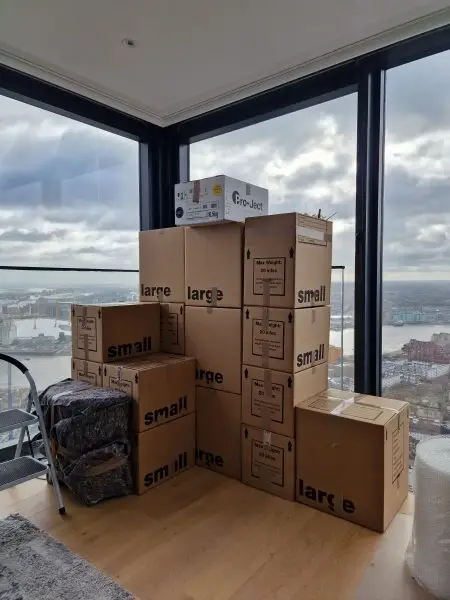Top 10 moving mistakes when moving home
And here come the most common mistakes non-professional movers make in everyday life, and what you should do to avoid them (generally you will avoid all movers mistakes by hiring Best London Removals to do the removal job for you, but not all people are that wise):
1. Packing takes time – don’t forget it.
Well, if you are to do the packing on your own, just plan it carefully. Packing, padding, and securing all the belongings in even the smallest flat can take an unexpected amount of time. You should make a list of your goods, divide them into categories, and group them according to the packing boxes.
Hiring professional packers, movers, and sometimes cleaners is a good option, but not everyone is willing to trust outsiders for the job. Anyway, don’t forget that being unprepared when the moving trucks arrive is never a good idea.
2. Take your most valuable personal belongings with you
A moving mistake people often make is to pack their documents and/or valuables with other stuff, forgetting that in most cases they would not accompany them on the way.
3. Make the proper estimation of the goods to be moved
Figuring out the exact total volume of the items that need to be moved can be tricky. In general, it’s a job best left to experts. Good moving companies will send a representative round to your home or flat for an on-site appraisal before offering an exact quote. Beware of those who offer figures over the phone. You might end up paying a lot more than the quoted amount.
Underestimating volumes can also be a problem when moving to storage. There are few things worse than arranging to get heavy furniture and other items to a storage site, unloading, and then realizing the only available unit is too small. If in doubt, be generous when estimating the amount of space you’ll need. Having too much is always better than having too little!
4. Insurance – a must-have, but get to know the small letters
Most reputable long-distance movers offer two levels of insurance policy. The standard one may not cover the full cost of expensive items. It almost certainly won’t. Always read the fine print carefully and ask pointed questions about insurance before hiring movers. Consider the higher level of cover if you’re entrusting any high-value furniture, works of art, or even expensive clothing to any professional moving company.
5. Label your belongings so it’s clear what’s inside the box
Labeling boxes carefully may add a little extra time to the packing and moving process, but it is worth it. The time spent making sure each box is marked with the type of contents and the destination room will be more than repaid at the unpacking stage when informative labels make the job much easier and far more efficient. The right label will also make sure boxes containing fragile items are treated carefully and not stacked under anything heavy.
6. Measure, don’t (under)estimate
The large wardrobe that fits comfortably in your current bedroom may not be quite as suitable for your new one. Consider the floor plan of the new home (with proper measurements) and make sure there is space for all your furniture. You’ll also have to get it into position. Measure all the biggest items and make sure you’ll be able to get them up the stairs to your new flat or in the door to your new home. If there is going to be a problem, it’s far better to know about it in advance rather than getting a dining table stuck in a tight stairwell!
7. Again – Plan your removal – do not call the mover at the last minute!!!
8. Require a written estimate.
You want to know, in writing, what the company believes the move will cost. You also want to know, in writing, what that estimate means to that company. Can they raise your bill on the moving day? Does the contract allow them to bill you for more later? Once you pay them on delivery, are you done?
9. Play fair – never forget to tell the company about the stairs in your new home or that oak furniture hiding in the attic.
If the estimate is based on a move without stairs and your new home is two flights up, the company will add that to the cost. So give an honest assessment of the job and you’re more likely to get a realistic estimate.
10. Neglecting to back up your computer.
When you move, your life becomes a study in Murphy’s law. So if you have vital data in your computer, or anywhere else, make a couple of copies and stash them in various locations.











